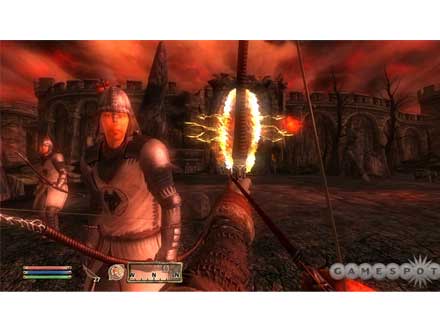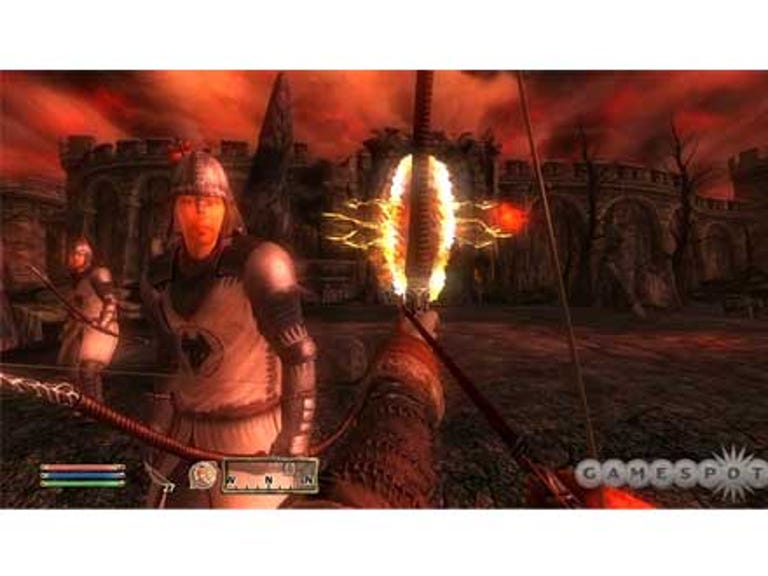 Why You Can Trust CNET
Why You Can Trust CNET Elder Scrolls IV: Oblivion review: Elder Scrolls IV: Oblivion
The Elder Scrolls IV: Oblivion is simply one of the best role-playing games ever made.
This is a rare and remarkable achievement -- a huge, open-ended, complex, detailed role-playing game that's fun to play and a pleasure to behold. Oblivion not only delivers everything that earned the Elder Scrolls series the devoted loyalty of a huge following of fans, but also significantly improves on the weaknesses of its 2002 predecessor, Morrowind.
The Good
The Bad
The Bottom Line
The Elder Scrolls series is known for its sheer size and depth. Oblivion lives up to this pedigree, putting you into a massive, cohesive, highly immersive world. You get to create your own character -- the possibilities for customisation seem limitless -- and then explore the world as you will. There's a compelling main quest for you to follow, which takes about 40 hours to finish the first time through, but the majority of the game's content is peripheral to that main quest. You can root out evil in hidden dungeons, join and climb the ranks in a number of different guilds, visit all the different towns and try to solve everybody's problems, compete in a long series of gladiatorial battles to the death, break into someone's home and rob them in their sleep, get caught and face the consequences, contract a disease that leads to vampirism and then try to find a cure, buy a house, steal a horse, invest in your favourite shop, and, if you can believe it, there's much more.

So the breadth of content is as remarkable as ever, but the most important thing is this: The many types of gameplay in Oblivion are well-designed and deeply satisfying, even when taken on their own. That's the main difference between this game and Morrowind. This may be a role-playing game, but you could play it like a pure action game, or like a stealth game, or like an adventure game, and it'd still be at least as good, if not better, than games that are specialised in these regards.
Oblivion does a great job of quickly introducing you to all these different aspects of play, successfully engaging you rather than overwhelming you. You see the world through your character's eyes, but a behind-the-back perspective is also available. Initially you just pick a name, race, and gender for your character, and the game opens with you stuck in a dungeon cell, being taunted by a fellow inmate. Somehow, though, you get swept up in a desperate escape attempt by the emperor and his loyal retinue of protectors. The emperor, voiced unmistakably by Patrick Stewart ((i class=a2)Star Trek: The Next Generation, X-Men), recognises you from a portentous dream and entrusts you with the search for his illegitimate heir. But first, you'll need to escape from the Imperial City's sewers. As you make your way through this basic dungeon crawl, you happen upon ill-fated adventurers, their stuff, and some ornery goblins, so you immediately get to play around with close combat, ranged attacks, magic, sneaking, lock picking, equipment repairing, and more.
Toward the end of this sequence, the game does a clever job of recommending a character class to you based on how you've been playing. For example, if you've gone toe to toe with every goblin you've seen, hacking them up with an axe, you might make a good barbarian. But the game's numerous premade character classes aren't nearly as interesting as the ability to create your own custom class. The choices are numerous but clearly presented, and while you could go out of your way to create a fairly useless character, your intuition will easily guide you through what's a complex process. You choose an underlying specialisation -- combat, magic, or stealth -- then you choose a couple of primary attributes, seven major skills, and even a birth sign. Basically, you're choosing your character's talents. Every character can use every skill; it's just a question of how well.
That's not to say you can play Oblivion like a pacifist, since the main quest and many others are combat-intensive. But all the fighting in this game is probably one of the best parts. Visceral toe-to-toe melee battles have you carefully negotiating the distance between you and your opponent while switching between quick and powerful attacks, sometimes pausing to manually deflect your enemy's blows with your weapon or shield. Specifically, melee combat feels faster and smoother than it did in Morrowind, since in that game, it was possible to whiff blows against enemies while still appearing to hit -- in Oblivion, close combat (as well as ranged combat) looks and feels much more solid. Your foes are generally quite smart, too.
A stealthy approach can be a tantalizing alternative, since sneaking up behind an opponent, pick-pocketing him, and then finishing him off with a single, deadly sneak attack can be at least as satisfying as slugging it out. And there are a wide range of magic schools to choose from, as well. Blast your foes with elemental spells, summon demonic aid or otherworldly weapons, charm your enemies into laying down their arms, debilitate the toughest monsters into simpering wimps that even a magic-user could beat up, make yourself invisible or really fast, and on and on. Whether you're playing on the Xbox 360 or PC, you can select a number of spells, items, and/or weapons for easy access in the heat of the moment.
Of course, there's much more to the game than combat against a wide variety of scary-looking bad guys. Simply exploring one of the game's towns and interacting with its populace can be a remarkable experience. Characters don't all stand around like they did in Morrowind; they're on a schedule, so they'll go to work in the morning and go to bed at night, and you can catch them going from place to place, talking to each other about recent rumours, and so on. Almost every character in every town is unique, apart from the generic guards you'll find patrolling around (though every city's guards are different, clad in their respective armour and uniforms).
Also, the way the quest system is structured in Oblivion is a huge improvement to the way quests were handled in Morrowind. In this game, anytime you're given a quest, you're prompted with a clear summary of what the quest is about and what you're supposed to do or where you're supposed to go. All your pending quests are clearly listed as part of the game's well-designed menu system, and you can set any of them to be your active quest, which automatically marks your objective on your map and gives you a compass waypoint to follow. This means there's next to no time wasted confusingly wandering around, looking for the right person to talk to or the next place to go.
In fact, you can instantly travel to all major metropolitan areas right from the start, or any other landmarks you've previously discovered. Through the "fast travel" feature on the world map, Oblivion simulates the amount of time it would have taken you to hoof it from point A to point B, so if you'd prefer to quickly teleport from one town to another instead of go by foot or on horseback, you're free to do that. Certainly, the game rewards you for exploring on your own, since you'll find all kinds of uncharted places worth visiting.
On that note, the game's level of challenge feels just right by default, though you can adjust a difficulty slider if you want to make it easier or harder. There's so much to do at any given point that even if you do get stuck on something, you can always come back to it later and go do something else that's fun and rewarding.
It's true that the artificial intelligence in Oblivion doesn't always put on a good show. You can break into someone's home and wake them up for a chat, and they'll chat with you like nothing's happened. The guards still might suddenly show up, seemingly without notice, but probably because one of them saw you crack the lock on the front door. Sometimes you'll battle alongside computer-controlled allies, but while these guys may be likable, they really aren't good at self-preservation, and you'll probably catch yourself mourning their loss more than their comrades will. Also, you can't bash stuff open, and no bathrooms are to be found anywhere in a world that's otherwise so finely detailed that it genuinely seems lived in. And the things about it that aren't always realistic or believable can still be amusing and entertaining.
Considering all that's in this game, it's surprisingly difficult to find much fault with any of it. The inventory system could have been a little more streamlined, and the encumbrance system will quickly disrupt your plans to pick up and carry as much stuff as you'll wish you could, but these things are hardly worth mentioning. However, some reference to the game's technical performance is necessary. On the Xbox 360, you can look forward to a usually fast and smooth frame rate and graphics that look especially dazzling on a high-definition display. On a high-end PC, you can get the game looking even better, though unless you have a fast graphics card and at least a gig of RAM, you might have a hard time getting the game to appear pretty while moving at an acceptable frame rate at a high resolution. The frame rate especially tends to bog down when a lot of characters are simultaneously onscreen, which might explain why there aren't as many people milling about in the cities as you might hope for. Controls are as good on the Xbox 360 as on the PC, though using the PC's number keys is a little easier than using the 360 controller's D pad for quickly switching between items and powers.
What's overwhelming about Oblivion is how good it is and how much there is to it. Literally almost everything that's ever been done well before in past role-playing games is in here -- done at least as well, if not better. It's just too bad there's no multiplayer.
Just kidding.
Keep up to date with the latest games news, reviews and features by signing up to CNET.com.au's free Games Spotlight weekly newsletter. Sign up now!
